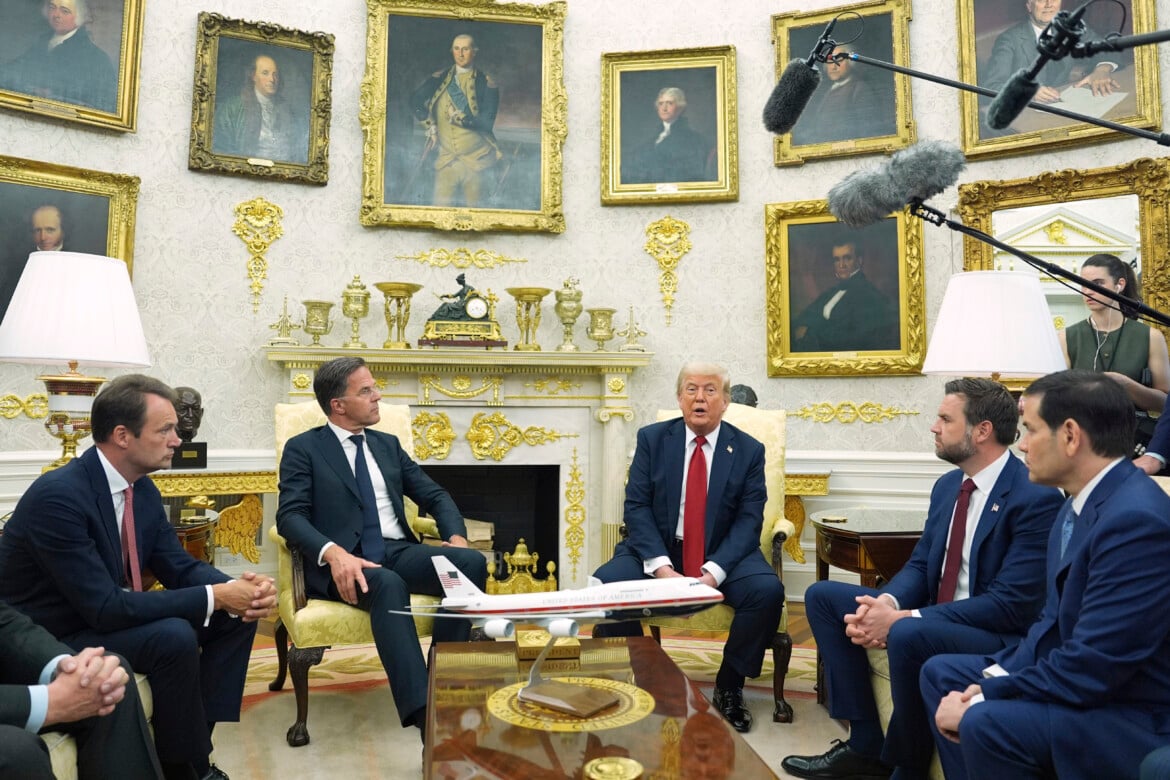Analysis
Trump wants NATO to buy weapons for Kyiv – made in America only
Rutte beamed: “You want Ukraine to have what it needs. But you want Europeans to pay for it – which is totally logical.” Is it really “logical” or pure Trumpian blackmail?

Donald Trump has not earmarked any more funds for Ukraine, hasn’t issued any real ultimatum to Moscow and hasn’t unveiled any clever roadmap that might yield a quick ceasefire. Even the distinction between possible tariffs and sanctions on Russia had to be clarified later by Commerce Secretary Howard Lutnick. For now, the only concrete move is to make NATO pay for U.S.-made weapons bound for Kyiv – announced just after his new, written threat of 30% tariffs on European imports.
Since the NATO summit in The Hague, Trump seems obsessed with bringing Europe to heel, while the continent’s leaders aren’t pushing back, but using Washington’s demands as cover to rearm in a hurry. French president Emmanuel Macron vows: “we will double the defense budget by 2027,” while German chancellor Friedrich Merz promises to make the Bundeswehr “the most powerful conventional army in Europe” – even as the far-right National Rally and AfD are right before the gates of power, something Paris and Berlin appear willing to overlook.
Monday's Oval Office press conference with NATO secretary-general Mark Rutte replayed a familiar script, with the twist that the European bit-players seemed almost delighted with their roles. Moscow dismissed it as “all smoke and no fire,” and it’s hard to fault that assessment.
“We are really unhappy with Russia – I am particularly unhappy,” Trump began, pulling faces and using bar-room slang. “We’ll impose very severe tariffs if we don’t reach a deal within fifty days – tariffs of around one hundred percent that you call ‘secondary duties’ and you know what that means. We’ve spent about $350 billion on this Russia-Ukraine war; I want to see it end. It wasn’t my war – Biden started it. I am very disappointed in President Putin; I thought we’d have a deal two months ago, but we’re not even close. It couldn’t be simpler.”
It turned out not to be that simple to reach a deal on Ukraine quickly, as he touted on the campaign trail. But his reaction, coming from his frustrated egocentricity, is to blame Biden and send the bill to a weaker party – the EU.
One should not imagine that Trump’s view of Volodymyr Zelensky has shifted since the televised humiliation at the White House in February. What has changed is that Zelensky now listens – must listen – and, in a way, draws advantage from it, as the war continues. As regards Putin, Trump concedes, “the conversations with him are nice, and then at night the missiles fall.” From that admission springs his new phony ultimatum: 50 days to reach a deal.
Yet 50 days at this stage of the conflict merely grant Russian forces extra time to advance. Trump may imagine that if Moscow reaches the “administrative borders of the four partly occupied regions,” which Axios reported Putin mentioning in a July 3 phone call, the Kremlin will actually stop. Still, secondary tariffs – customs duties levied on any country trading with Russia – would batter Russia’s economy; and the “secondary sanctions” that Lutnick confirmed Trump actually meant could bite harder still. However, in two months everything can change, especially with such a volatile president.
What is certain for now is that NATO members will foot the bill for the U.S. weapons Trump intends to ship; the one who will cash the checks is the same man who made the decision. If Brussels is so eager to arm Kyiv, wouldn’t it be better to pool resources to produce German Taurus cruise missiles (the only European anti-air systems that come close to the U.S. Patriots) – or other European systems – on EU soil? No one seems to be asking that question at the moment. Berlin’s defense minister Boris Pistorius, in Washington to finance two Patriots (and who has explicitly refused providing the Taurus), certainly isn’t; nor will Finland, Denmark, Sweden, Norway, the Netherlands and Canada, which have already volunteered to pay.
Rutte beamed: “You want Ukraine to have what it needs. But you want Europeans to pay for it – which is totally logical.” Is it really “logical” or pure Trumpian blackmail? If a government balks at buying American arms, what then?
There are no answers to such questions as of now, but they go to the heart of the matter: Trump does not seek to help Ukraine; he is using it to raise cash and to punish Putin, guilty not of invading Ukraine but of refusing to indulge him.
Originally published at https://ilmanifesto.it/le-armi-usa-per-kiev-dovra-pagarle-la-nato-a-mosca-falso-aut-aut on 2025-07-15
